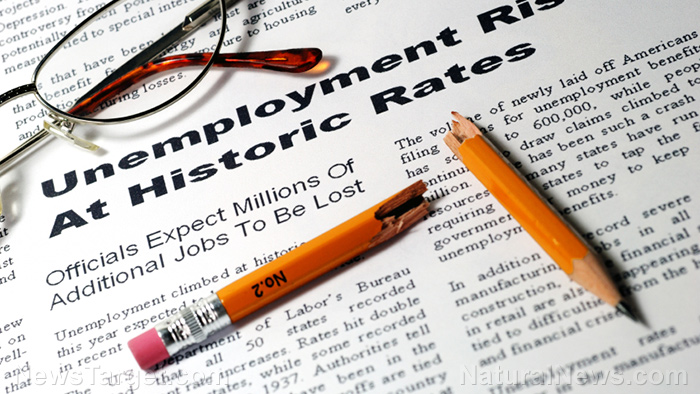Thousands of Britons take to the streets to protest against rising inflation and cost of living
10/13/2022 / By Kevin Hughes

Thousands of people all over the United Kingdom took to the streets to protest against inflation and the rising cost of living. The “Enough is Enough” rallies organized by worker unions and climate change activists kicked off on Oct. 1 in the capital London and other major U.K. cities.
Protesters who gathered at the King’s Cross district of London demanded a pay raise to match rising inflation, currently unprecedented in 40 years. One attendee named Helen said she joined the rallies in opposition of the incumbent Conservative (Tory) government.
“We need to get rid of this Tory government. People are going to really suffer in all sorts of ways, and we don’t know where it’s going to end.” she said. Helen also pointed to incumbent British Prime Minister Liz Truss, who she claimed is on “the far, far right.”
According to the protester, the mini-budget mulled by Truss and Chancellor of the Exchequer Kwasi Kwarteng would be “disastrous for this country.” The mini-budget provided enormous tax cuts for those earning more than £150,000 ($166,230). Similar protests in the central English city of Birmingham were held in opposition to the Tories’ handling of the situation on Oct. 2. (Related: Food and fuel shortages, price spikes continue to get worse in protest-hit Ecuador.)
The tax-slashing plans included under the mini-budget went way too far than many anticipated by canceling the maximum rate of income tax and removing a cap on bankers’ bonuses. It subsequently triggered chaos in the British financial market, with the pound dropping to an all-time low against the U.S. dollar. Investors also began searching for exits as the fiscal plan threatened to extend the crisis-struck nation’s finances to a breaking point.
Truss and Kwarteng later defended their economic package. In an article for the Sun, the incumbent prime minister admitted that the plans caused “short-term disruption.” But the prime minister still promised to push through with the mini-budget and handle the public coffers with “an iron grip.”
Meanwhile, Kwarteng wrote in the Daily Telegraph that His Majesty’s Treasury will reveal a “medium-term fiscal plan” that will commence a way to lowering borrowing, alongside “new fiscal rules and a commitment to spending discipline.”
Tory blunder could pave the way for a Labor majority in Parliament
Many Britons blame the Tories for the country’s financial crisis, with more than half having doubts toward Truss. This could eventually mark the return of the opposition Labor Party as the majority in Parliament. Former British Prime Minister Gordon Brown, who served in the role from 2007 to 2010, was the last chief executive under the party.
Incumbent Labor leader Keir Starmer has pledged to restore the U.K. economy, enhance public services and bring the government out of an “endless cycle of crisis” if he is picked to head the nation on the next general elections.
During a speech at his party’s annual conference in the northern city of Liverpool, Starmer criticized the Conservatives’ decision to cut taxes for the wealthiest amid a critical cost of living crisis, pushing voters not to “forget” or “forgive” the moves before a much-awaited national vote in 2024.
Starmer asserted that the Labor Party was once more “the party of the center ground” and vowed to fix the U.K.’s ailing economy, revive the country’s National Health Service and meet the climate crisis.
“This is a Labor moment. Britain will deal with the cost-of-living crisis. Britain will get its future back. That’s my commitment to you, the national mission of the next Labor government. And together with the British people, we will do it,” Starmer told the big crowd in Liverpool.
Follow Collapse.news for more news about the rising inflation and cost of living in England.
Watch the video to know more about the U.K.’s financial crash.
This video is from the Real Deal Media channel on Brighteon.com.
More related stories:
More Americans are living paycheck to paycheck as inflation persists
Inflation continues to hurt Americans despite Biden’s claim of strong economic recovery
Survey reveals 29% of Americans are withdrawing their savings to cover basic costs of living
Sources include:
Submit a correction >>
Tagged Under:
big government, Bubble, chaos, Collapse, Conservative Party, cost of living, debt collapse, economic collapse, fiscal policy, Inflation, Keir Starmer, Kwasi Kwarteng, Labor Party, Liz Truss, mini-budget, money supply, protests, revolt, risk, tax cuts, United Kingdom, uprising
This article may contain statements that reflect the opinion of the author
RECENT NEWS & ARTICLES
COPYRIGHT © 2017 PENSIONS.NEWS
All content posted on this site is protected under Free Speech. Pensions.news is not responsible for content written by contributing authors. The information on this site is provided for educational and entertainment purposes only. It is not intended as a substitute for professional advice of any kind. Pensions.news assumes no responsibility for the use or misuse of this material. All trademarks, registered trademarks and service marks mentioned on this site are the property of their respective owners.




















